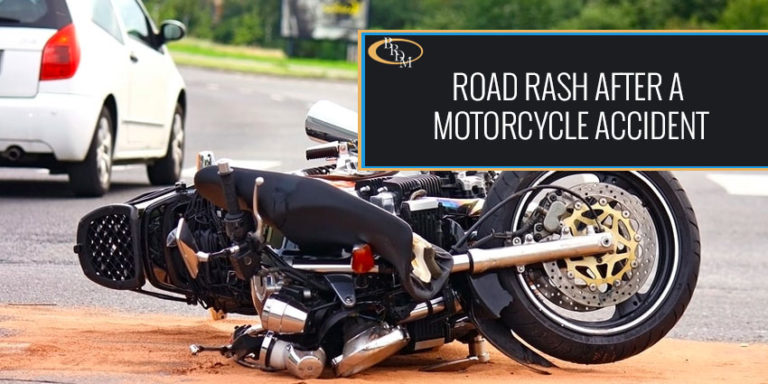Motorcycles are known to cause some of the most catastrophic traffic-related injuries. Motorcyclists just don’t have the same protective barrier as passenger vehicles. As a result, they often sustain serious injuries that can cause long-term effects or cause permanent disability. In addition, road rash is a common injury that motorcyclists get in an accident.
Many of us have experienced road rash, perhaps from a fall while running or biking. However, road rash from motorcycle accidents is much more severe than what most of us have experienced. It does not compare to scraped knees. The level of pain, the potential for infection and scarring, and the need for skin grafts associated with motorcycle road rash are entirely new levels of trauma compared to minor scrapes and burns. There is also a danger of sepsis with severe road rash, which can be life-threatening if not treated immediately.
Road rash is traumatic and difficult in many ways. For example, it’s not necessarily easy to treat. It’s expensive, painful, and time-consuming.
Motorcyclists who suffer road burns from another negligent driver could seek compensation for their injuries and losses. In this article, we’ll discuss how serious road rash is, how to treat it, and why you might need legal counsel.
Table of Contents
- What Is Road Rash?
- What Are the Different Degrees of Road Rash Injury?
- Tips for Treating Road Rash Injuries
- How Should I Treat a Second or Third-Degree Wound?
- What Factors Can Affect the Severity of Road Rash Injury?
- Why Is It Necessary to Get Prompt Medical Attention for Road Rash?
- Contact a Florida Motorcycle Accident Lawyer Today
What Is Road Rash?
When a motorcyclist flies off the motorcycle from the impact of a crash, they can get dragged across the pavement. The resulting abrasion caused by friction is called road rash.
Road rash occurs when the motorcyclist flies off at high speed, and their skin gets scraped. The abrasive concrete scraping skin at high speeds is excruciatingly painful and causes permanent scarring. Not only are road rash injuries immensely painful, but they also require specialized and extensive medical care.
What Are the Different Degrees of Road Rash Injury?
Much like any other burn injury, road rash had varying degrees. First-degree road rash is the least severe type, for example, when you scrape your knee. On the other hand, third-degree road rash is serious skin trauma and damages the tissue under the skin. The majority of motorcycle accidents that involve road rash are third-degree burns.
From a general medical standpoint, here are the different degrees of road burn:
- First-degree road rash (minor injury)- first-degree road rash is similar to a scrape, sometimes a little worse. The skin is broken, and the injury victim might experience light bleeding, tenderness, and bruising. With first-degree road rash, there’s a very small chance of permanent scarring. Treatment requires cleaning, bandaging, and keeping it clean.
- Second-degree road rash (serious injury)- second-degree is much more serious than first-degree. It occurs on the top layer of the skin. The epidermis breaks, making it very painful. Additionally, you might experience bleeding, swelling, heat radiating from the injury site, and exposed tendons or nerves. However, this doesn’t require as much treatment as a third-degree road rash injury. With any degree of road rash, keeping the injury site clean is essential to avoid infection.
- Third-degree road rash (severe injury) – third-degree road rash is excruciatingly painful and is considered a medical emergency. This level of road rash breaks the inner layer of the skin (dermis). As a result, fat, tissue, and bone can become exposed. Such an injury requires intensive and urgent medical attention. Finally, third-degree road rash is most likely to cause permanent scarring.
If an accident results in second- or third-degree road rash, other injuries are likely. A motorcyclist who strikes the asphalt often sustains road rash with other severe injuries such as:
- Broken bones
- Spinal cord injuries
- Traumatic brain injury
- Other catastrophic injuries
Tips for Treating Road Rash Injuries
No matter what degree of road rash you have, it’s best to seek medical attention right away. It’s important to clean the injury to remove debris and prevent infection or further injury. Even if you think your road rash is minor, seek medical treatment to be sure your injury doesn’t worsen. If you are positive you only have minor first-degree road rash, follow these steps:
- Wash your hands thoroughly to avoid transferring dirt or bacteria to the wound
- Carefully and gently remove any particles from the injury site, and run lukewarm water over the wound if there is a lot of debris. Be gentle and let the injury breathe for a moment.
- Then, cover the scrape with a topical antibiotic and a very thin, breathable gauze. Covering it will ensure you prevent infection.
How Should I Treat a Second or Third-Degree Wound?
If you have a damaged nerve or the road rash has broken several layers of skin, you need professional medical treatment. Failing to do so could result in infection or further damage. In the most severe cases of road rash, the injured victim might require surgery or a skin graft.
Do not assume that you only have a minor injury because you don’t feel pain. It’s possible for the initial shock of the crash to release adrenaline which can mask your pain. Also, if you leave your injury untreated, you could damage tissue, muscles, tendons, nerves, arteries, veins, internal organs, and bones.
What Factors Can Affect the Severity of Road Rash Injury?
The speed at which motorcyclists travel often leads to second and third-degree road rash. Even a motorcyclist traveling at 15 mph will sustain severe and painful road rash. But, that will not be nearly as catastrophic as motorcyclists going at 80mph and the. Crashes. At that speed, the motorcyclist could die or end up with the worst degree of road rash.
Speed is the main determining factor for the outcome of road rash severity. Other factors that can affect the severity of motorcycle accident injuries include:
- Weather conditions
- Type of surface you land on
- How much the officer slides on the surface of the road
- The amount of protective gear and type of clothing the motorcyclist was wearing
Why Is It Necessary to Get Prompt Medical Attention for Road Rash?
You may not need to seek medical care for first-degree road rash. However, for second or third-degree road rash, medical care is critical. There are several reasons you need to get medical attention ASAP for road rash.
First, you need to ensure your health and well-being. Not only will second and third-degree road rash be painful to the injury victim, but they also have a higher likelihood of infection and other complications if not treated appropriately. In addition, once the initial shock and adrenaline of a motorcycle crash wear off, you might realize that your road rash is more severe than you thought.
In addition to cleaning and caring for your injury, you’ll want a medical treatment record for your motorcycle accident claim. Medical documentation is an essential part of building your case, especially if you want to seek compensation. You must prove that the other driver’s negligence caused the accident and led to your injuries. Furthermore, you must demonstrate that you took your injuries seriously and sought immediate medical care rather than delaying. Waiting too long to get medical care could lead a jury or the insurance company to believe your injuries were not that serious.
Contact a Florida Motorcycle Accident Lawyer Today
Motorcycle accidents are some of the most disastrous and traumatic motor vehicle crashes. Riders are at higher risk of catastrophic injuries and death if they crash at high speed. For motorcyclists, the negligence of other drivers can be devastating.
Our team of experienced Florida Motorcycle Accident Lawyers have handled numerous motorcycle accident cases. We fight hard to help injury victims and their families recover full and fair compensation. Additionally, we are committed to helping injury victims, or surviving family members hold negligence drivers accountable.
If you have suffered road rash or other serious injuries in a Florida motorcycle accident, we could help you. Call us today for your free initial consultation.



